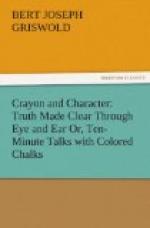“But today we shall talk about a boy who never depended upon luck at all. This boy had a pair of sharp eyes, and whenever he saw anything to do, he did it. His name was Benjamin Franklin. Did you ever hear of him? Yes, I thought so. This boy worked for his older brother in a printing office in Boston, but the brother used to flog him and treat him roughly. Benjamin knew that they could never get along well together, so he went away to Philadelphia.
“In this great city he saw many things which other boys before him had not seen. He saw that the printing art had wonderful possibilities in it; he studied and worked hard to improve the business, and today all of the printers call him the father of the art of printing. He saw that he ought to know other languages besides English, and so he became a master of French, Italian and Latin—and luck’ hadn’t a thing to do with it! He saw on every hand many chances to help other people. This prompted him to organize the first police force and the first fire company in the United Colonies; he organized a military company; he paved the streets of Philadelphia and taught the people how to keep them clean; he founded a hospital; he invented the first practical stove; he accepted many public positions in his earlier years, including that of member of the general assembly of the colonies, deputy postmaster of Philadelphia and commissioner to treat with the Indians.
“He saw that the common people should have a better chance to get an education, and so he published for many years Poor Richard’s Almanac, which provided them with much that they should have known; he founded the first circulating library, helped to establish the University of Pennsylvania, and brought into existence the American Philosophical Society.
“He saw the lightning, just as millions before him had done; but, unlike the others, he believed the brilliant display was the evidence of a great and unseen power—electricity. By the use of his now famous kite and key he proved it to be so, and for a time he was the only man in the world who knew what lightning really is.
“He saw at the time of the impending Revolutionary war the need of someone to go to England to intercede in the interests of the colonies; and so, when the choice fell upon him, he did not shirk the responsibility.
“He saw many later duties which caused him to become a member of the Continental Congress which made George Washington the commander-in-chief of the Colonial army; he helped to write the Declaration of Independence; he was a commissioner of peace to confer with the British General Howe; he was a member of the commission to seek the aid of France; he was America’s first postmaster general.
[Illustration: Fig. 14]
“Did Benjamin Franklin depend upon luck? Never! His was, rather, a five-leaf clover, like this: [Quickly add the fifth leaf to the drawing, and insert the letter P, completing Fig. 14.] ’Whatsoever thy hand findeth to do,’ says the Bible, ‘do it with thy might.’ I believe Benjamin Franklin fulfilled this command; and we can do it ourselves, if we will. He never stopped to ‘knock on wood’ to prevent bad luck! He had better sense. And I hope we have, too.”




